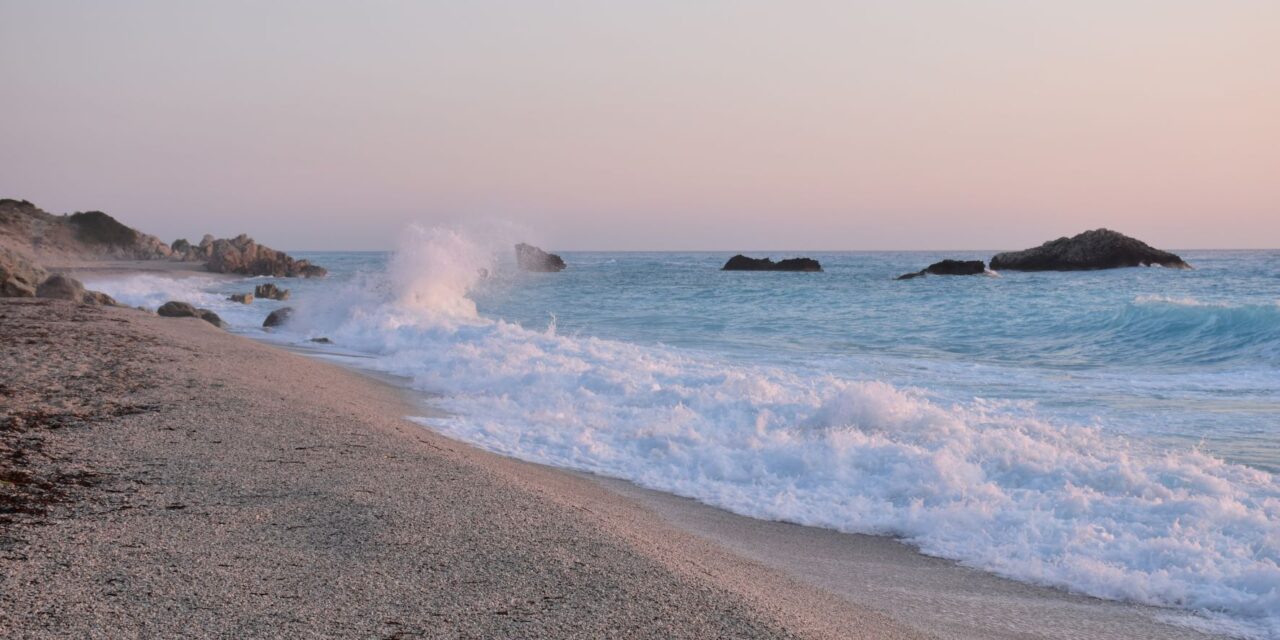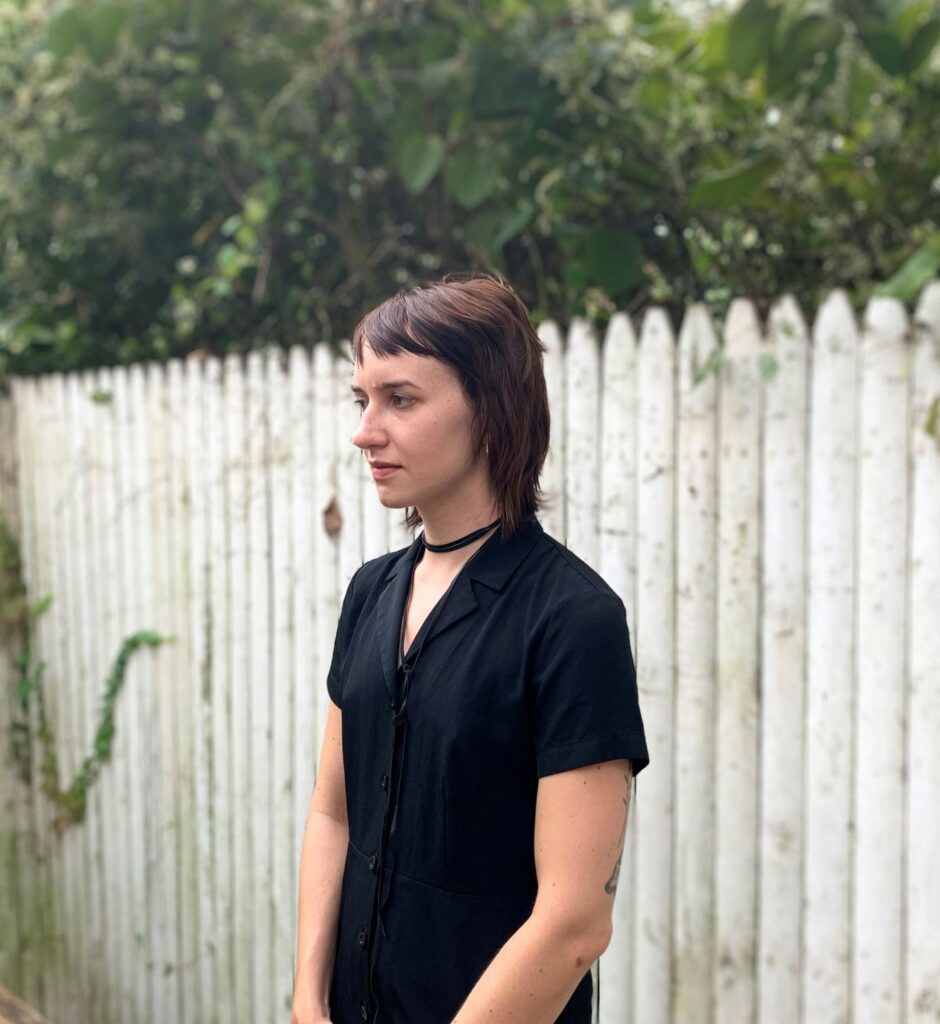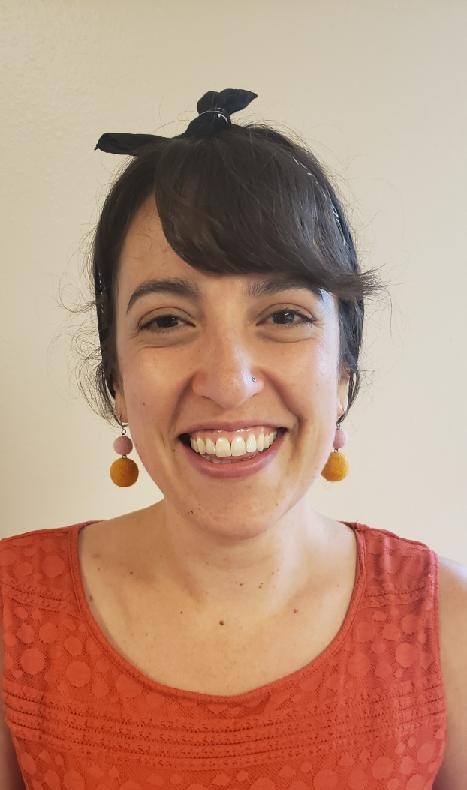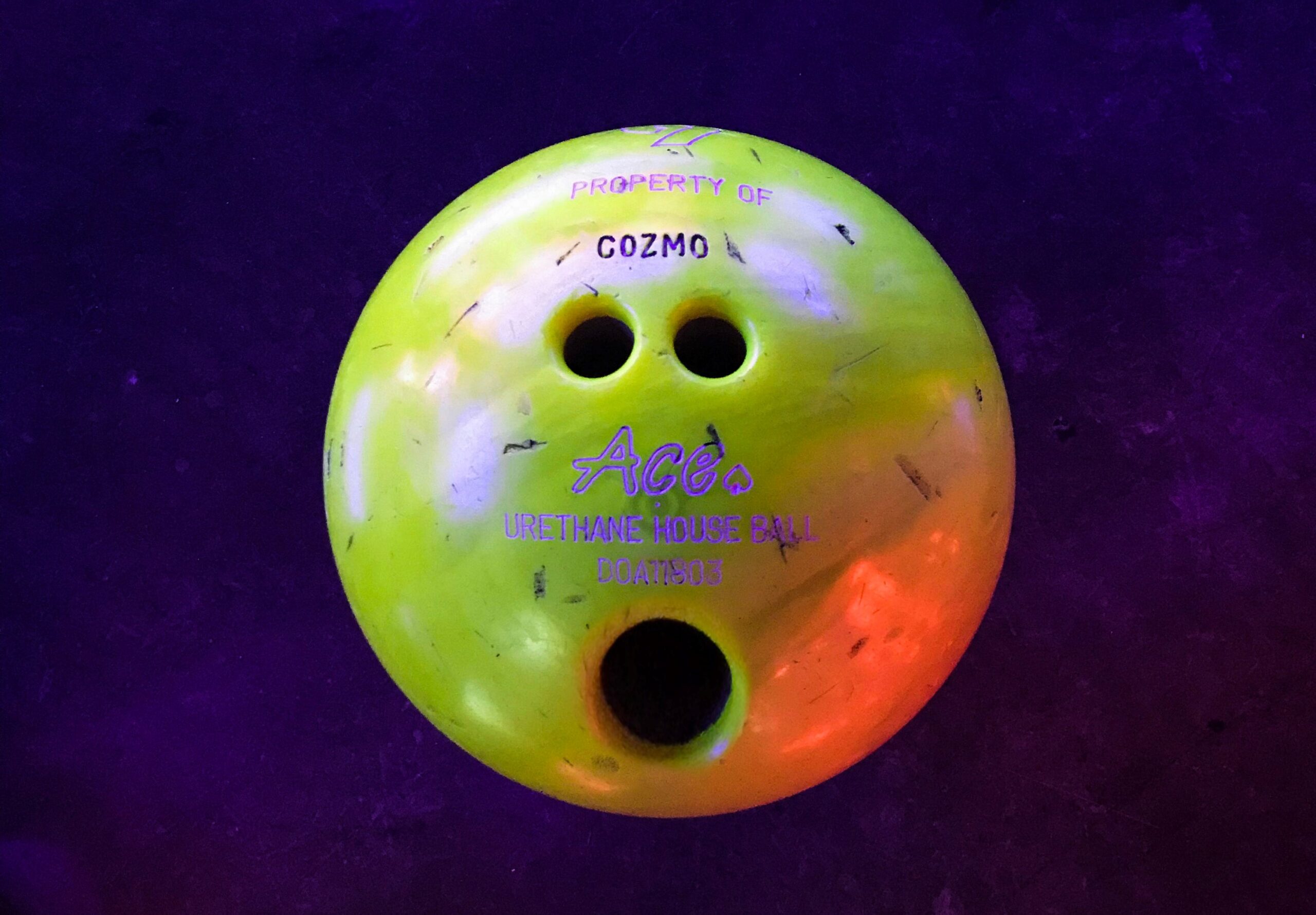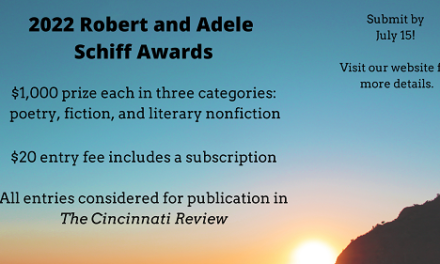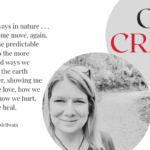Winners of the Thirteenth Annual Robert and Adele Schiff Awards
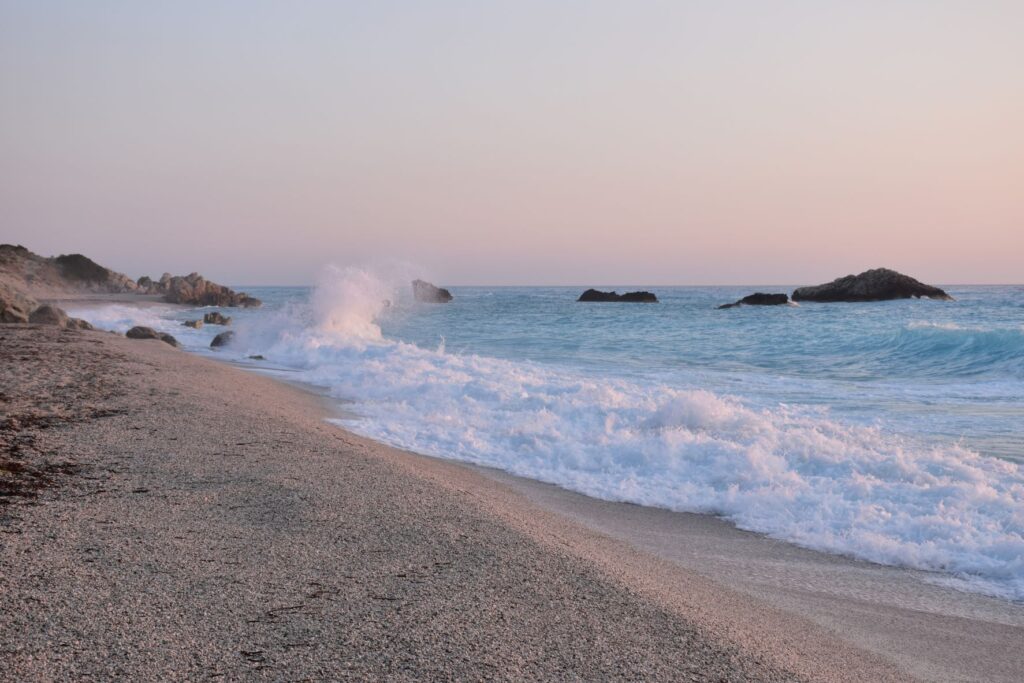
Barbara Paulus for her essay “Beaches”
chosen by Kristen Iversen
Faire Holliday for her story “Standing Still”
chosen by Michael Griffith
Emma Miao for her poem “Fifty years after the war”
chosen by Rebecca Lindenberg
Thank you to everyone who entered our contest this year! We so enjoyed reading your wonderful poems, stories, and essays.
Paulus, Holliday, and Miao will each receive a $1,000 prize, and their pieces will appear in the Spring 2022 issue of The Cincinnati Review. Read more below about the inspiration behind their work!
We also want to recognize all the honorable mentions:
Marilyn Abildskov
Mildred Barya
Jerome Blanco
Ben Boegehold
Kathy Chao
April Darcy
Alyson Mosquera Dutemple
Brendan Egan
Shannon Fandler
Liz Howey
Maija Makinen
Alexandra Munck
Alec Osthoff
Kristie Redfield
Shannon Robinson
Julia Strayer
Sandra Stringer
Kristin Walrod
Lastly, we’d like to thank our readers Toni Judnitch and Lisa Low for their assistance during this year’s contest period.
On “Beaches” by Barbara Paulus
Literary Nonfiction Editor Kristen Iversen: “Beaches” is a winding, lyrical, erudite essay that urges the reader to examine memory, trauma, nostalgia, and time through discrete moments of insight and awareness, all the while holding the reader spellbound by the distinctive writing style. A pleasure to read, and an essay that stays in the heart and mind long after the first reading.
Paulus on her winning essay: Many of the personal memories I touch on in “Beaches” I originally tried writing into different essays and stories, but I was never satisfied with the result and felt like I needed more of a structure to unite them. I was inspired by Agnès Varda’s film Beaches of Agnès and the innovative way she discusses her own life through film. I had written a separate draft of an essay focusing only on her film and other research about film and memory. The initial connecting link between my own memory and Varda’s was, of course, the beaches of our childhood. By beginning there I was able to let the rest of my essay take shape, referring back to the film as I incorporated more personal memories about my childhood, my father’s death, and my response to her film. Beaches unite Varda’s film in the same way Beaches unites my essay.
Barbara Paulus is a writer, photographer, and visual artist based in New York. She formerly resided in the oldest housing structure in New York State. Her writing and visual art has appeared in various zines. The Cincinnati Review is her first major literary publication.
On “Standing Still” by Faire Holliday
Fiction Editor Michael Griffith: Former Cincinnati Review fiction editor Brock Clarke concludes his essay “The Case for Meanness in Fiction,” from the book I, Grape, on this pungent note: “[This] should illuminate something for us fiction writers: that the world, with its demands that in our fiction we be good, that we be nice, that we be kind, that we devote ourselves to the beauty of the human heart, makes it difficult for us to see that our job as fiction writers is, not to be mean for meanness’ sake, but rather to find ways to be honest about how very difficult it is to be good.”
Faire Holliday’s “Standing Still,” winner of this year’s Schiff Award, provides a bracing and delightful example of what Clarke means. It’s the portrait of a complicated young woman who—the better angels of her nature having abandoned her, possibly to dance on the head of a pin—is doing the flawed, ragged, selfish best she can. Some writers see an alluring safety in setting one’s stories in a world that’s been morally childproofed for our and its characters’ protection—a world where everyone is impeccably right-minded, right-hearted. Holliday resists that, to her story’s great benefit, and to the reader’s. This is a story with plenty of sharp edges on which to cut ourselves.
Holliday on her winning story: Most of my stories start with a character. More to the point, most of my stories start with a character that I don’t particularly like, but want to understand. The protagonist in this story came to me in a flash of inspiration one day when I was riding on the back of my partner’s motorcycle. It was in the early months of the COVID pandemic, and I’d been reflecting a lot on stagnancy. In addition to what was going on in the wider world, I’d recently moved, started a new career, and gotten married. As someone who has always loved the potential of new things, I found myself wondering what people do to replace the excitement of big life changes. All of a sudden, I felt this new character emerging from the fog in my head: someone who is so afraid of stagnancy that they live their life trying to avoid it. That’s really where it started. I’d had an experience in my earlier years of trying to date someone who had a kid, and it seemed only natural to put the main character in that situation and see where it went.
Faire Holliday is an emerging writer. Although she’s been writing in her spare time for most of her life, this will be her first published story.
On “Fifty years after the war” by Emma Miao
Poetry Editor Rebecca Lindenberg: “Fifty years after the war” is a poem that captures, in lavish and surprising imagery, the difficulty in stitching together personal history across generations and continents. A dress calls to mind the body that once inhabited it as well as the place it once came from and where it was worn, pulling those two histories together.
Language is doing double- and triple-duty throughout the poem too, acting as both artifact and action—“pattern” becomes at once a pattern and to pattern through the deft use of line breaks. That a dress might be “seaming” touches so many synapses in the brain—it “seams” in its visible stitches, it “seems” in a metaphorical sense, but it also calls us in its strangeness to think of something at once “seething” and “gleaming,” not unlike the image of the “spectacle” of a “dying fire” that repeats and recontextualizes itself in the poem, or the image that rhymes with that one, of “flaming red silk flapping in a speckled swath of night.” The poem is attentive to its music, but its music is not sentimental or nostalgic; it’s a dissonant and modern-sounding music, more reminiscent of Bartok than Bach.
And that works for this poem, full of both beauty and terror, ending (as it does) with both the visual and aural image of “iron rings,” whose resonant tone lingers in the mind, carries us out beyond the end of the poem. I love the originality and daring of this piece, and I’m delighted to select it for this year’s award.
Miao on her winning poem: New Year’s Day 2021, 12:00 a.m., I sat in my room and scrawled in my blue notebook the first draft of this poem. I was mulling over a conversation I had had with my Grandma. She was recounting her childhood, growing up in the Cultural Revolution, sharing the memories behind a dress and a ring she saved from the Red Guards. I considered how artifacts preserved moments, how historical erasure occurs when the artifacts are stolen or twisted out of context, similar to a wire inside a dress that weakens with time. I considered ownership and loss; spectacle and animalism; the dress-like nature of memory, flapping in the wind, ephemeral, lucid. I considered what it means to burn a part of one’s identity, and how we are the children of the ashes, of erasure through fire, piecing the past together again.
Emma Miao is a writer from Vancouver, British Columbia. She is the author of Geography of Mothers (Frog Hollow, 2021). Her work is published in Diode Poetry Journal, HOBART, Frontier Poetry, Quarterly West, Atlanta Review, and Permafrost Magazine. She is a Foyle Young Poet of the Year and winner of the F(r)iction Poetry Contest 2020. Her poem “Rabbits on the Balcony” won The Fiddlehead‘s Ralph Gustafson Prize for Best Poem. Find her at emmamiao.com.
To order the prizewinning issue (due out in May), check out our subscription options.

